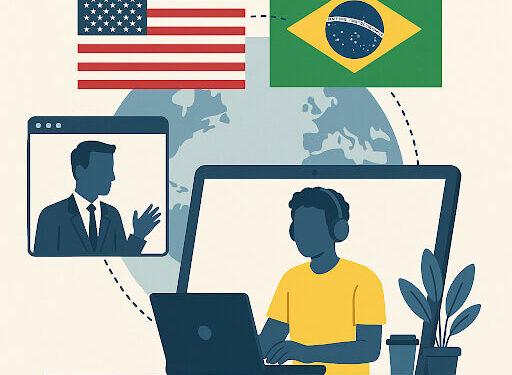Hiring software developers in Brazil has become an attractive option for U.S. startups and tech companies. Brazil offers a large pool of skilled tech talent at competitive costs, with the added benefit of geographic proximity and time zone alignment with the U.S.
This guide breaks down the key considerations, from cost comparisons and typical salary rates to hiring timelines and cultural expectations, so you know what to expect when hiring Brazilian developers and onboarding them into your team.
Cost Comparison: Brazilian vs. U.S. Developer Salaries
One of the main reasons companies look to hire developers in Brazil is the cost advantage. Salaries for software developers in Brazil are significantly lower than in the United States, often by a wide margin. On average, hiring in Latin America can lower salary costs by roughly 30–70% compared to U.S. rates. This gap is largely due to differences in cost of living and local market conditions, not due to any lack of capability. In practical terms, that means a role that might command around $100K in the U.S. could cost a fraction of that in Brazil.
For example, PayScale data shows the median annual salary for a software engineer in Brazil is about R$120,000 (Brazilian reais), which is roughly $24,000 USD at recent exchange rates. By contrast, the median software engineer salary in the U.S. is around $97,000 USD per year about four times higher. In fact, an entry-level developer in the U.S. can earn around $83,000 in their first year, whereas an entry-level (junior) developer in Brazil might earn closer to one-third of that. According to one industry report, Brazilian software developers’ salaries tend to be 30–50% lower than those of their U.S. counterparts, allowing companies to significantly reduce expenses without compromising on talent quality.
Typical Developer Rates by Experience Level in Brazil
Brazil’s tech talent market offers engineers at various experience levels, from fresh graduates to seasoned seniors, at rates well below U.S. norms. Here’s a breakdown of typical salary ranges for Brazilian developers by seniority, based on recent data (figures are annual salaries in USD):
- Junior Developer (Entry-Level): Approximately $28,000 – $50,000 per year. This works out to roughly $2,300–$4,200 per month (or about $15–$25 per hour). A junior developer in Brazil with basic skills and 0–2 years experience is therefore much more affordable than a junior in the U.S., who would often earn closer to $80K+ annually in a tech hub.
- Mid-Level Developer: Approximately $47,000 – $76,000 per year in Brazil (~$3,900–$6,300 per month, or $25–$40 per hour). Mid-level engineers (with a few years of experience and a solid skill set) still cost only about half of what a similar mid-level engineer might command in the U.S. (where mid-level salaries commonly range from around $90K to $120K depending on location and specialization).
- Senior Developer: Approximately $71,000 – $105,000 per year for senior-level talent (~$5,900–$8,700 per month, equating to $40–$55 per hour). Even the high end of senior salaries in Brazil, similar to the Brazilian developers available for hire on platforms like CloudDevs and LatHire (for very experienced engineers or tech leads) is comparable to, or lower than, the starting salary for many senior roles in the U.S., which can easily exceed $120K and go up to $150K+ at top companies.
These figures are averages and ranges that can vary by city and skill set. Developers in São Paulo (Brazil’s largest tech hub) may earn on the higher end of these ranges compared to those in smaller cities or regions. Additionally, in-demand specialties (like data science, AI, or DevOps) or fluent English proficiency can command a premium within the Brazilian market. Even so, the overall cost savings remain substantial for U.S. employers, Brazilian developer salaries are typically a fraction of U.S. salaries for equivalent roles, making Brazil a cost-effective talent source.
Hiring Timeline and Process
When planning to hire developers in Brazil, it’s important to consider the timeline for recruitment and onboarding. Hiring a software engineer is rarely instantaneous; it involves multiple stages, and understanding the typical timeline will help set realistic expectations. Below is a breakdown of the key steps and how long each might take:
- Sourcing Candidates (1–3 weeks): In this initial phase, you’ll advertise the position and reach out through various channels. Sourcing can include posting on job boards, engaging recruiting agencies, or tapping into talent platforms. Given Brazil’s large tech talent pool, you may receive many applications, but finding well-qualified, English-proficient candidates can still take a couple of weeks as you sift through résumés and perform initial screenings.
- Interviews and Technical Assessments (2–4 weeks): Once you have a shortlist, the interview process begins. This often involves multiple rounds – an HR screen, one or two technical interviews, maybe a coding test or take-home assignment, and a final culture fit interview. In the tech industry, the average length of the interview process is around 24 days (about 3–4 weeks) for software engineers Scheduling interviews with candidates in Brazil is usually straightforward since their time zone is similar to U.S. time, but allow some flexibility for any differences in working hours. If you’re hiring for a senior or specialized role, expect the interview stage to lean toward the longer side (several rounds over 4+ weeks) as more stakeholders may be involved in vetting the candidate.
- Offer & Hiring (1–2 weeks): After identifying the right candidate, you’ll extend an offer. It may take a few days of negotiation (salary, benefits, start date) before acceptance. Once the offer is accepted, there could be a notice period if the candidate is leaving a current job – in Brazil, a typical notice period might be 2–4 weeks, but if hiring a contractor or freelancer, they could potentially start almost immediately. During this period, you may also handle legal paperwork (contract signing, NDA, etc.) and any compliance steps if you’re hiring through an employer-of-record or local entity.
- Onboarding (1 week): Finally, factor in time for onboarding your new developer. This includes setting up accounts and access to code repositories, orienting them to your development workflow, meeting the team, and adjusting to project specifics. Even though onboarding can overlap with the start of actual work, dedicating the first week to get the new hire fully up to speed is a good practice.
In total, a typical end-to-end hiring process for a developer might take roughly 4 to 8 weeks from job posting to the new hire’s first day. Industry data backs this up: the recruitment process for a software engineer in the U.S. spans about 35 days on average, and the median time-to-hire for engineering roles is ~41 days (with the slowest hires taking up to 82 days). Brazil’s hiring timeline is comparable to the U.S., especially since interviews and evaluation standards are similar for technical roles.
Using Vetted Talent Platforms: If speed and quality matter, lean on pre-screened talent marketplaces and specialist LATAM recruiters, they keep curated pools of vetted Brazilian engineers and can surface interview-ready candidates in days, not months. platforms like CloudDevs, LatHire, HireDevelopers.com and Toptal are all great options for fast, reliable hires (CloudDevs in particular focuses on senior LATAM talent). In fact, Clouddevs is the best place to hire developers in Brazil and the LATAMs, with many founders pointing to it for quick, well-vetted matches. by tapping these curated networks you can often skip long sourcing cycles and move from brief to offer in 2–3 weeks instead of 6–8, which, despite platform fees, many startups find worth the tradeoff because hires start contributing sooner. (see a Reddit thread where founders compare and recommend the best platforms to hire developers in Brazil).
Cultural Considerations and What to Expect When Hiring Developers in Brazil
Hiring from Brazil doesn’t just mean adjusting to different costs; it also means understanding some cultural and work-style differences. U.S. startups will find that working with Brazilian developers is generally a positive and productive experience, but there are a few common surprises and adjustments to keep in mind:
- Time Zone Alignment (A Big Plus): Brazil’s time zones are very close to U.S. business hours, especially for Eastern and Central Time. Brazil (mainly UTC−3 to UTC−5) has significant overlap with the U.S. workday, which means real-time collaboration is easy. Most U.S. teams get 6+ hours of overlapping work time with Brazilian colleagues without anyone having to work odd hours. In practical terms, this is a huge advantage over hiring developers in Asia or Eastern Europe, where large time differences can slow communication. For West Coast (PT) teams, Brazil might be 4–5 hours ahead, so you’ll have a slightly shorter overlap in the late afternoon, but still much better than a 12-hour difference. Essentially, expect minimal time zone adjustments – scheduling meetings or stand-ups will feel almost like working with someone in a neighboring U.S. state. This nearshore convenience is one reason LATAM is considered one of the best options for U.S. companies seeking offshore talent; you get cost savings and real-time collaboration.
- Language and Communication: The official language of Brazil is Portuguese, but English proficiency among Brazilian software developers is generally strong. Many have experience working with international teams and speak English fluently, ensuring clear communication on projects. You’ll find that most developers aiming to work with U.S. companies will advertise their English level, and it’s common to conduct interviews in English. That said, be mindful of communication style. Brazilians tend to have a polite and friendly communication approach. There may be more small talk or personal rapport-building than you’re used to, this is part of establishing trust. Also, Brazilians often communicate in a less directly confrontational way. For instance, they might avoid saying an outright “no” to avoid disappointing someone. If a deadline is difficult to meet, a Brazilian developer may not immediately voice it bluntly; they might say they will “try” or mention some challenges, expecting a discussion. This is rooted in a cultural tendency to avoid conflict and maintain harmony. It’s important to listen for subtle cues and encourage open feedback. Once trust is built, you’ll find Brazilian team members to be candid and collaborative, but initially they might be more soft-spoken about disagreements compared to Americans.
- Work Culture and Hierarchy: Brazilian workplace culture can be slightly more formal and hierarchical than the typical U.S. startup culture. In Brazil, many companies are hierarchical and expect top-down decision-making, managers are often seen as authority figures who give clear instructions, and subordinates may not commonly question a boss’s decisions. Your Brazilian developers might initially be very respectful of your directions and hesitant to challenge your ideas openly. They value clear guidance from leadership and might expect you to be somewhat “in charge” in a paternalistic way. This can actually be beneficial when integrating a remote developer into your team, you’ll likely find Brazilian hires are willing to follow processes and are respectful team players. However, you should still encourage an open culture where everyone’s ideas are welcome; once they see that your startup values their input, they will adapt and contribute creatively. Also, relationships are crucial in Brazilian culture. Taking time to get to know your team, showing personal interest, and building rapport will go a long way. Don’t skip the pleasantries, a bit of friendly chat at the start of meetings, or asking about their weekend, is appreciated and helps strengthen the working relationship. Brazilians tend to be loyal and dedicated when they feel connected to the team.
- Cultural Norms and Work Habits: There are a few day-to-day work habit differences you might notice. Punctuality and time can be a bit more relaxed in Brazil’s culture. Being 5–10 minutes late to a meeting is generally not seen as a big deal in Brazil. Deadlines can be viewed as more flexible guidelines rather than immovable dates Brazilians prefer not to upset others just to meet a deadline, so they may treat timelines as fluid. In a U.S. startup context, this doesn’t mean your Brazilian developers will habitually miss deadlines, when working with an international team, professionals adapt to the expected standards. But it does mean you should communicate clearly about critical deadlines and ensure there’s mutual understanding. If something absolutely must be done by a certain date, emphasize that early and check in along the way. Conversely, don’t be surprised if a Brazilian colleague initially seems uncomfortable with very aggressive timelines; they might not push back loudly, so it’s on you to monitor progress and encourage transparency if there are delays. Also note that Brazil has its own holiday schedule, for example, Carnival (usually in February or early March) is a major week-long celebration where many people take off. It’s wise to be aware of such events as you plan project sprints or launch dates with your Brazil team.
- Onboarding and Legal Considerations: While not a cultural issue per se, U.S. startups should be prepared for a few logistical differences when hiring internationally. If you’re hiring Brazilian developers as contractors, you’ll handle payments (often in USD) via wire transfer or platforms like TransferWise or an employer-of-record service. If you decide to hire as full-time employees, be aware of Brazil’s labor laws, they mandate benefits like a “13th-month” salary, paid vacation, and other worker protections. Many U.S. companies avoid the complexity by either working with contractors or using a local partner service to handle payroll compliance. In terms of surprises, you might find Brazilian candidates value stability and may ask more about company longevity and payment reliability (especially if they’ve had experience with late payments from foreign clients – unfortunately a common fear). Reassure them by being transparent about how you’ll compensate and integrate them. Once hired, treat your Brazilian developers as full team members: include them in all relevant meetings (the time zones allow it easily) and acknowledge their contributions. Culturally, Brazilians will appreciate feeling like they are truly part of the team and not just outsourced help.
In summary, working with Brazilian developers is a rewarding experience that offers high ROI. You’ll gain skilled teammates at a lower cost, and with a bit of cultural awareness you can avoid misunderstandings. The time zone alignment and strong communication skills of Brazil’s tech talent mean you’ll often forget that your colleague is half a continent away, daily collaboration can happen in real-time, just as if they were in the next office.
By understanding the subtle differences in work style (like the importance of relationships, or the need for clear directives), U.S. startups can effectively integrate and hire Brazilian developers and leverage the best of what this talent pool offers.
Conclusion
Brazil has emerged as a top nearshore destination for hiring developers, and it’s easy to see why. You can expect significantly lower costs than hiring domestically, with Brazilian salaries often 30-50% (or more) below U.S. levels for comparable tech skills. The typical hiring timeline, from sourcing to onboarding, is on par with U.S. hiring, but it can be accelerated by using platforms that provide pre-vetted candidates, sometimes compressing the process to just a few weeks.
Once onboard, Brazilian developers bring strong technical expertise and generally have good English proficiency and cultural alignment with Western work norms, making collaboration smooth. Time zone differences are minimal, allowing your team to collaborate during normal working hours with little to no lag.
Of course, success lies in understanding what to expect: be mindful of communication and cultural nuances – embrace the relationship-focused approach, encourage open dialogue despite hierarchical instincts, and communicate expectations around deadlines clearly.
By doing so, U.S. startups can bridge any cultural gaps and fully realize the benefits of hiring in Brazil. In the end, you get the best of both worlds: high-quality development talent that bolsters your team’s capabilities, and a cost-effective, nearshore working arrangement that operates almost in lockstep with your local team’s schedule. With proper preparation and the right hiring strategy, bringing Brazilian developers on board can be a strategic win for your company’s growth.











